June 22, 2025 | 06:00 GMT +7
June 22, 2025 | 06:00 GMT +7
Hotline: 0913.378.918
June 22, 2025 | 06:00 GMT +7
Hotline: 0913.378.918
Editor's note:
On the occasion of the 30th anniversary of the establishment and development of the Department of Quality, Processing, and Market Development (Ministry of Agriculture and Rural Development), Vietnam Agriculture Newspaper is honored to introduce a series of articles by former Minister of Fisheries Ta Quang Ngoc about a starting period with new thinking that creates a solid foundation and contributes to bringing Vietnamese agricultural products to more than 180 countries and territories as of today.
On August 26, 1994, Minister of Fisheries Nguyen Tan Trinh signed Decision No. 648 TS/QD, establishing the National Fisheries Inspection and Quality Assurance Center with the trading name of NAFIQACEN (1). As of now, that event has been going on for 30 years.
On this occasion, I would like to send my congratulations to the Department of Quality, Processing, and Market Development (Ministry of Agriculture and Rural Development) and to the collective of officials and experts who are implementing the work of quality management and safety and hygiene of agricultural products. Particularly, I would like to send my congratulations and gratitude to those who have worked at NAFIQACEN for succeeding with this important, new, strenuous, and exciting type of activity right from the first years of establishment.
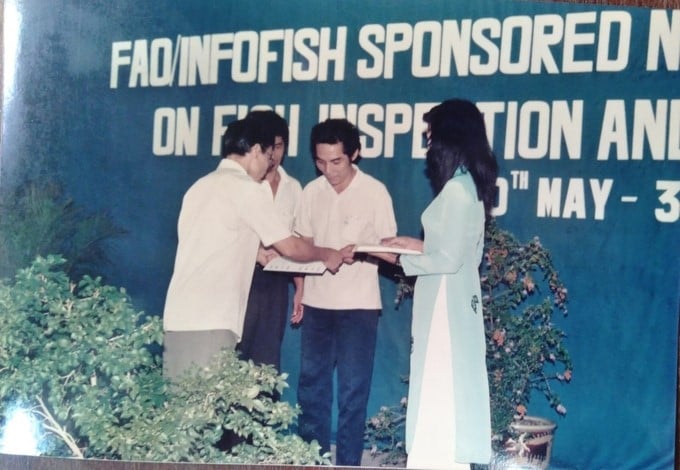
Mr. Nguyen Tu Cuong was the first to receive the certificate, then the first Director of NAFIQACEN in 1994. Documentary photo of former Minister Ta Quang Ngoc.
At this time, I also respectfully mention good memories of the KCS Center under SEAPRODEX Vietnam, which was a reliable facility helping the Ministry of Fisheries manage the quality of exported seafood before NAFIQACEN was established.
The Center worked with specialized units of the Ministry of Fisheries to search for and acquire new knowledge on seafood quality management in the late 1980s and helped organize training classes in the early 1990s on hygiene and safety and fisheries inspection. Many of NAFIQACEN's core professional staff later matured in the working environment here.
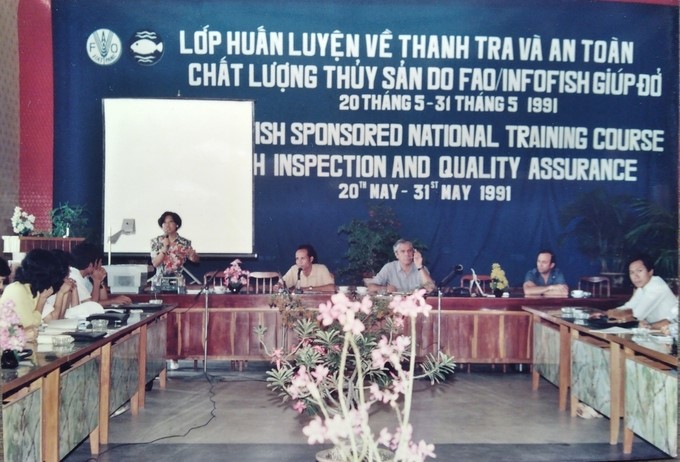
Ms. Sirilac, a Thai aquatic food safety expert, provided training on inspection and food safety and hygiene for NAFIQACEN officials. Documentary photo of former Minister Ta Quang Ngoc.
The birth of a working unit always comes from work requirements and actual circumstances. The reason why NAFIQACEN was born is no exception. However, this organization's presence at that time had an extremely special meaning. Associated with it, underpinning and supporting the success of its work, is new thinking, a new methodology, and a new approach to seafood quality and hygiene (later, expanded to all agricultural products).
NAFIQACEN has helped the fisheries industry quickly catch up with the international integration trend in food safety and hygiene that was formed in the late 1980s and was carefully prepared to apply to Vietnamese seafood in the early 1990s (2). Thereby, making the fisheries industry a pioneer in proactively meeting the strict requirements of international trade activities related to food safety and hygiene of seafood in particular and agricultural products in general during Vietnam's integration process, starting from the most demanding market, the European Union (EU) market.
The Vietnam - EU diplomatic relationship was established at the end of November 1990. In July 1995, the two sides signed the "Cooperation Framework Agreement, establishing basic principles to promote economic and trade relations between the two sides." During this period, the Party and State prioritized building the fisheries industry into a key economic sector (1992) and initiated important innovations.
In seafood trade, the EU market requires exporting countries to develop and enforce laws and rules ensuring food safety that are equivalent to hygiene standards applied in the EU. Take the Hazard Analysis Critical Control Points (HACCP) as the basis for the approach. Products must be produced under conditions equivalent to those of EU businesses, and there must be a competent authority on quality management as a trusted partner of the EU's corresponding agencies.
NAFIQACEN truly became their trusted partner just a few years later. In Vietnam's seafood export achievements, NAFIQACEN's contributions were imprinted at one time.
Initially, activities on aquatic food safety and hygiene focused mainly on quality assurance standards and programs originating from factors within the scope of processing factories. But later, they quickly reached out to most of the relevant external factors, especially the stage of producing and supplying raw materials.
Controlling hygiene conditions "From pond to table" is a familiar saying about the area of operation of those working in the field of aquatic food quality management and safety, initially for raw materials for export and later for food serving domestic consumption. Traceability has become an essential practice and procedure.
Along with many other countries at that time, Vietnam’s fisheries industry since the first half of the 1990s has started a way of working on product quality and hygiene that is completely opposite to the previous method, when relying only on final product inspection (through the "doors" of KCS) and conducting inspections according to the retrospective principle to "reset" the production lines from reality.
Now, it must be about implementing a preventive strategy when applying HACCP based on a thorough analysis of the conditions that govern the product formation process. This method is more economical and much safer. Product quality is guaranteed more proactively thanks to strict practice standards and reasonable quality safety programs.
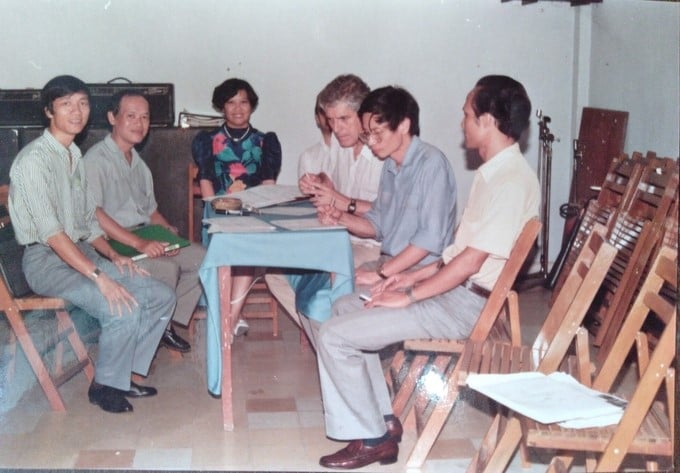
Preparing the schedule for the first HACCP training class in May 1991. Documentary photo of former Minister Ta Quang Ngoc.
To evaluate the results of Vietnam - EU cooperation in the 1990–2015 period and prepare for a Cooperation Agreement in the new period (3), in 2015, the European Union Delegation to Vietnam released a bilingual English-Vietnamese book by author Andrew Hardy with the title 25 Years of Friendship and Development.
The book's page 57 stated that "The success of NAFIQACEN evaluates the complete change of Vietnam's fisheries industry" and "By the year 2000, the production (in my opinion, the author's intention is limited to processing industry and related quality assurance capacity) of Vietnamese seafood is comparable to any country thanks to its 'parity' with the EU. The application of EU standards has opened up opportunities for Vietnamese seafood to do business with the EU and laid the foundation for the world's very prosperous export trade."
In fact, with that success, after a while, we were basically no longer surprised by the regulations on food safety and hygiene in the US market and quickly increased seafood exports to this market after signing the Bilateral Trade Agreement (BTA) between the two countries in 2001. The same was true of the growth of seafood exports to other markets when conditions opened up, especially after Vietnam became a member of the WTO in early 2007.
Now, after 30 years, ensuring food safety and hygiene according to this method is common practice for all types of agricultural and food products. I still think that persistently using that method is also a treasure to make food cleaner for every home and to maintain and increase the reputation of our country's exported goods in the world market.
(1) Is the predecessor of the National Fisheries Quality Assurance and Veterinary Directorate (NAFIQAVED), then the National Agro-Forestry-Fisheries Quality Assurance Department (NAFIQAD) under the Ministry of Agriculture and Rural Development and is now an important function of the Department of Quality, Processing, and Market Development.
(2) Ta Quang Ngoc. HACCP and its application in Vietnam. Vietnam Fisheries Magazine, December 2015.
(3) The EU - Vietnam Free Trade Agreement (EVFTA) was signed on June 30, 2019, ratified by the European Parliament on February 12, 2020, and the Vietnamese National Assembly on June 8, 2020.
Translated by Thu Huyen
![Turning wind and rain into action: [11] Ten years before storms, after every harvest](https://t.ex-cdn.com/nongnghiepmoitruong.vn/608w/files/news/2025/06/20/z6704423696987_15fd32ffc26d590d204d520c9dac6786-nongnghiep-140922.jpg)
(VAN) With WeatherPlus, every raindrop and every breeze carries a message. And if we learn to listen, the fields will no longer live in fear of the weather.
![Turning wind and rain into action: [10] Advancing accessible climate services for farmers](https://t.ex-cdn.com/nongnghiepmoitruong.vn/608w/files/linhnhp/2025/06/20/1911-z6704423696987_15fd32ffc26d590d204d520c9dac6786-nongnghiep-161854.jpg)
(VAN) Not only does it help farmers 'avoid droughts and rains,' the development of agricultural climate services also enhances their ability to proactively adapt to a rapidly changing climate.
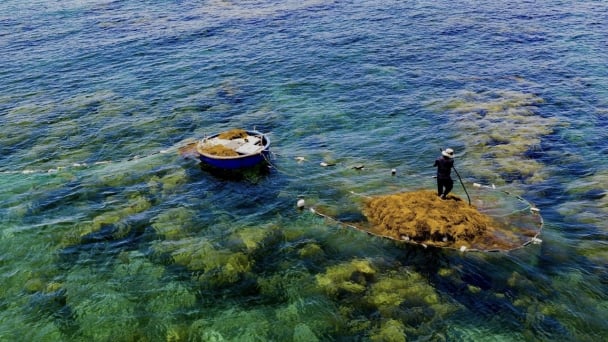
(VAN) With international assistance, the harvesting of sargassum seaweed in Quang Ngai has become increasingly regulated, thereby safeguarding marine life and ensuring the stability of coastal communities' livelihoods.
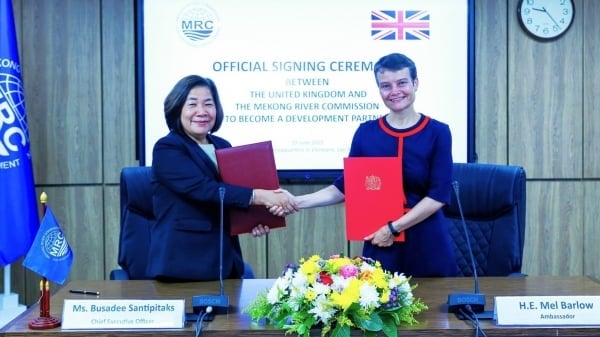
(VAN) On June 19, the United Kingdom officially became a Development Partner of the Mekong River Commission.

(VAN) Biodiversity is being threatened by traditional remedies made from wildlife. Traditional medicine and humans must change to live in harmony with nature.

(VAN) Agrifood investment and finance solutions for people and the planet.

(VAN) Microplastic contamination has become pervasive in seafood, posing unprecedented challenges for food safety and marine ecosystems.